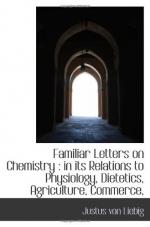It is a most curious fact that if we incinerate grain or its flour, peas, beans, and lentils, we obtain ashes, which are distinguished from the ashes of all other parts of vegetables by the absence of alkaline carbonates. The ashes of these seeds when recently prepared, do not effervesce with acids; their soluble ingredients consist solely of alkaline phosphates, the insoluble parts of phosphate of lime, phosphate of magnesia, and oxide of iron: consequently, of the very same salts which are contained in blood, and which are absolutely indispensable to its formation. We are thus brought to the further indisputable conclusion that no seed suitable to become food for man and animals can be formed in any plant without the presence and co-operation of the phosphates. A field in which phosphate of lime, or the alkaline phosphates, form no part of the soil, is totally incapable of producing grain, peas, or beans.
An enormous quantity of these substances indispensable to the nourishment of plants, is annually withdrawn from the soil and carried into great towns, in the shape of flour, cattle, et cetera. It is certain that this incessant removal of the phosphates must tend to exhaust the land and diminish its capability of producing grain. The fields of Great Britain are in a state of progressive exhaustion from this cause, as is proved by the rapid extension of the cultivation of turnips and mangel wurzel—plants which contain the least amount of the phosphates, and therefore require the smallest quantity for their development. These roots contain 80 to 92 per cent. of water. Their great bulk makes the amount of produce fallacious, as respects their adaptation to the food of animals, inasmuch as their contents of the ingredients of the blood, i.e. of substances which can be transformed into flesh, stands in a direct ratio to their amount of phosphates, without which neither blood nor flesh can be formed.
Our fields will become more and more deficient in these essential ingredients of food, in all localities where custom and habits do not admit the collection of the fluid and solid excrements of man, and their application to the purposes of agriculture. In a former letter I showed you how great a waste of phosphates is unavoidable in England, and referred to the well-known fact that the importation of bones restored in a most admirable manner the fertility of the fields exhausted from this cause. In the year 1827 the importation of bones for manure amounted to 40,000 tons, and Huskisson estimated their value to be from L 100,000 to L 200,000 sterling. The importation is still greater at present, but it is far from being sufficient to supply the waste.
Another proof of the efficacy of the phosphates in restoring fertility to exhausted land is afforded by the use of the guano—a manure which, although of recent introduction into England, has found such general and extensive application.




